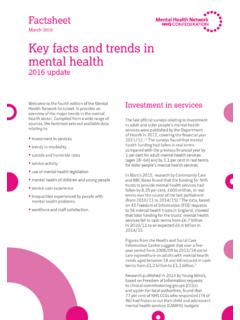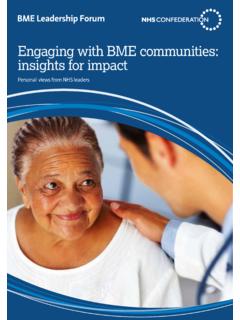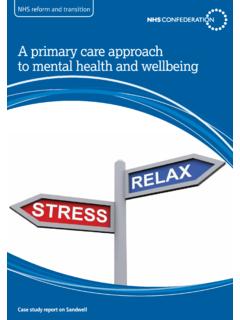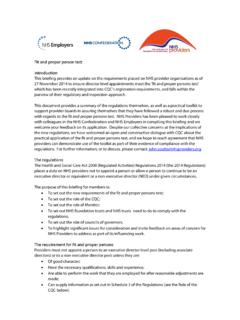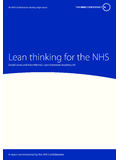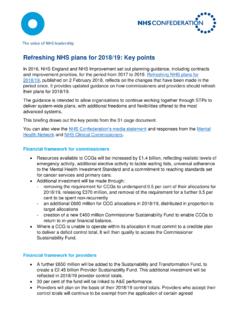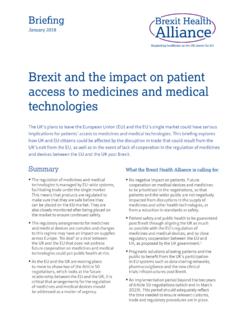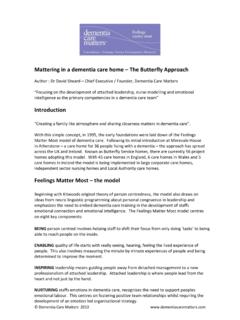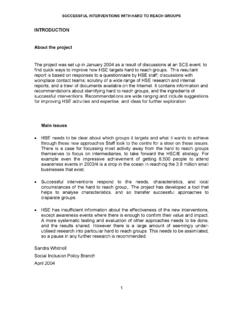Transcription of Acute awareness - NHS Confederation website
1 The voice of NHS leadershipAcute awareness Improving hospital care for people with dementiaThe NHS Confederation is the only independent membership body for the full range of organisations that make up today s NHS. We represent over 95 per cent of NHS organisations as well as a growing number of independent healthcare ambition is a health system that delivers first-class services and improved health for all. We work with our members to ensure that we are an independent driving force for positive change by:influencing policy, implementation and the public debate supporting leaders through networking, sharing information and learning promoting excellence in employment.
2 All of our work is underpinned by our core values:ensuring we are member driven putting patients and the public first providing independent challenge creating dialogue and consensus. For more information on our work, please contact:The NHS Confederation29 Bressenden PlaceLondon SW1E 5 DDTel 020 7074 3200 Email 978-1-85947-181-4 BOK60027 Registered Charity no. 1090329 Published by the NHS Confederation The NHS Confederation 2010 The use of this publication is covered by the conditions of Creative Commons Attribution-Non-Commercial-No Derivative Works License: You may copy or distribute this work, but you must give the author credit, you may not use it for commercial purposes, and you may not alter, transform or build upon this publication has been manufactured using paper produced under the FSC Chain of Custody.
3 It is printedusing vegetable-based inks and low VOC processes by a printer employing the ISO14001 environmental voice of NHS leadership ContentsExecutive summary 4 Introduction 5 Improving outcomes, quality and efficiency 7 Conclusions 15 Key questions for boards 16 References 17 Acknowledgements 18 Acute awareness : improving hospital care for people with dementia04 Executive summary dementia currently affects over a half a million people in England alone; this number is set to rise considerably as more people live longer.
4 Sixty thousand deaths a year are directly attributable to dementia , and the current cost to the NHS is estimated at billion a year. While this figure is the current estimate, it is probable that the actual cost is higher. This is because a large proportion of people with dementia are undiagnosed; also because many people with dementia go into hospital for a reason not related to their dementia and so the dementia is not coded. Recent Government policy has reflected a growing awareness of the importance of dementia care, with the publication of the first national dementia strategy being followed by increased funding and the appointment of a national clinical director for dementia .
5 Despite these and other efforts aimed at improving dementia care, there is still considerable scope for improving services in Acute hospitals, as identified by the Alzheimer s Society among others. At a time when cost savings are being keenly sought alongside service improvements, the National Audit Office and the House of Commons Public Accounts Committee have both identified significant potential efficiency savings. This report looks at the key issues for NHS trusts in improving care for patients with dementia , the majority of whom will have been admitted for another condition.
6 Acute awareness : improving hospital care for people with dementia highlights how hospitals can improve the quality and efficiency of Acute care for people with dementia . It showcases the innovative work that both NHS trusts and cross-agency partnerships are undertaking. As dementia is not generally the prime reason for admission to hospital, it can often be difficult to factor into a patient s care programme. Yet, as the report shows, improving services for patients with dementia has the potential not only to enhance the quality of their care experience but, by shortening their length of stay, to reduce unnecessary costs.
7 The report concludes with a list of key questions for boards to consider in developing their approach towards caring for patients with dementia , and some suggestions for policy developments that could enhance implementation of the national awareness : improving hospital care for people with dementia05 IntroductionWhat is dementia ? dementia is a syndrome (a group of related symptoms) that is associated with an ongoing decline of the brain and its abilities. These include1 thinking, language, memory, understanding and judgement; the consequences are that people will be less able to care for themselves.
8 The occurrence of dementia increases with age, as shown in Figure is a common condition:in England alone, there are currently 570,000 people living with dementia1the number is expected to grow to over one million people over the next 30 years160,000 deaths a year are directly attributable to dementia2the financial cost of dementia to the UK is over 17 billion a year, including billion to the surprisingly, dementia is becoming a higher priority. The Government has acknowledged the need to ensure that people live well with dementia .
9 The Department of Health launched Living well with dementia , the first national dementia strategy, in 2009the dementia strategy includes a specific objective to improve the quality of care for people with dementia in general hospitalsthe dementia strategy was backed by a detailed implementation plan and funding 60 million was allocated to PCT baseline budgets in 2009, followed by another 90m in April 2010 Professor Alistair Burns has been appointed as National Clinical Director for , in recent years there has been a series of other initiatives that support the implementation of the dementia strategy and the development of improved services for people with dementia and their carers.
10 These include:the Carers strategy 4 Lord Darzi s report High quality care for the Dignity in Care campaign 6 the Nutrition Action Plan. 7 Figure 1. Occurrence of dementia in people over 65between 65 and 69 years oldbetween 70 and 74 years oldbetween 75 and 79 years oldbetween 80 and 84 years oldaged 85 or overmenwomenSource: awareness : improving hospital care for people with dementia06 Despite these efforts, services for people with dementia still need to improve further:at the end of 2009, the Alzheimer s Society launched a report called Counting the cost,8 which looked at the quality of dementia care provided in hospitals.
